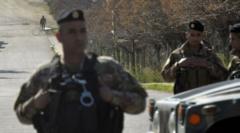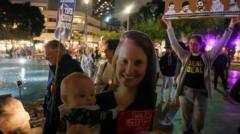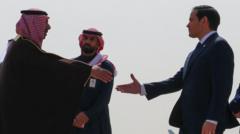Israel's decision to maintain troop presence in southern Lebanon, amidst the withdrawal agreement, raises concerns of escalated conflict, as Hezbollah's compliance with the truce remains in question.
Israel Maintains Military Presence in Southern Lebanon Amid Withdrawal Deadline

Israel Maintains Military Presence in Southern Lebanon Amid Withdrawal Deadline
The Israeli Defense Forces announce their intention to hold five strategic locations in southern Lebanon despite a deadline for withdrawal having passed.
As the deadline for a military withdrawal from southern Lebanon has passed, Israeli forces have declared their intent to remain in five strategic locations within Lebanese territory. This development, which occurred on Tuesday, has exacerbated tensions following a cease-fire initiated in November that marked the end of a significant conflict between Israel and Hezbollah.
The original agreement stipulated that both the Israeli military and Hezbollah were to withdraw their forces from southern Lebanon, thereby allowing the Lebanese army to establish control. The deadline for this withdrawal was postponed to February 18 after incidents of escalating violence along the border, raising discontent within Lebanese communities.
Speaking to the situation, Israeli Defense Forces spokesperson Lt. Col. Nadav Shoshani confirmed the troops would temporarily occupy these tactical points until the Lebanese army fully enforces the agreed-upon measures. However, specifics regarding how long this deployment would last were not disclosed.
This move has heightened fears that continued Israeli military presence could disrupt the fragile truce and foster further violence, particularly as many Lebanese nationals remain barred from returning to their homes located in contested areas amidst ongoing threats from Israeli military operations.
Under the truce terms, Hezbollah was also obliged to withdraw its fighters, clearing the way for an enhanced Lebanese military presence. Yet, repeated accusations from Israeli officials suggest that Hezbollah has failed to honor its commitment to the agreement. Despite acknowledgment from a U.S.-led monitoring committee regarding the Lebanese military's ongoing deployment, there has been no concrete public information regarding the withdrawal of Hezbollah's arms and personnel from the region, leaving the situation precarious.
As regional stakeholders watch closely, the dynamics between the involved parties remain tense, and the potential for resurgence of conflict looms large, underscoring the fragile state of peace in southern Lebanon.
The original agreement stipulated that both the Israeli military and Hezbollah were to withdraw their forces from southern Lebanon, thereby allowing the Lebanese army to establish control. The deadline for this withdrawal was postponed to February 18 after incidents of escalating violence along the border, raising discontent within Lebanese communities.
Speaking to the situation, Israeli Defense Forces spokesperson Lt. Col. Nadav Shoshani confirmed the troops would temporarily occupy these tactical points until the Lebanese army fully enforces the agreed-upon measures. However, specifics regarding how long this deployment would last were not disclosed.
This move has heightened fears that continued Israeli military presence could disrupt the fragile truce and foster further violence, particularly as many Lebanese nationals remain barred from returning to their homes located in contested areas amidst ongoing threats from Israeli military operations.
Under the truce terms, Hezbollah was also obliged to withdraw its fighters, clearing the way for an enhanced Lebanese military presence. Yet, repeated accusations from Israeli officials suggest that Hezbollah has failed to honor its commitment to the agreement. Despite acknowledgment from a U.S.-led monitoring committee regarding the Lebanese military's ongoing deployment, there has been no concrete public information regarding the withdrawal of Hezbollah's arms and personnel from the region, leaving the situation precarious.
As regional stakeholders watch closely, the dynamics between the involved parties remain tense, and the potential for resurgence of conflict looms large, underscoring the fragile state of peace in southern Lebanon.



















